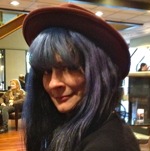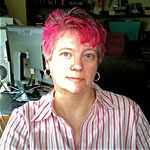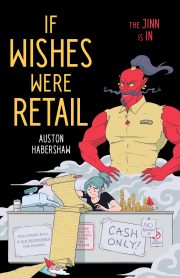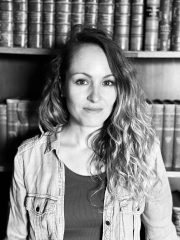An Interview with Stina Leicht
by Cat Rambo
 Stina Leicht’s debut novel, Of Blood and Honey, published by Night Shade Books, was shortlisted for the Crawford Award and has garnered Leicht a spot on the Campbell award ballot this year. The sequel, Blue Skies from Pain, appeared this year. Leicht is currently working on her next book.
Stina Leicht’s debut novel, Of Blood and Honey, published by Night Shade Books, was shortlisted for the Crawford Award and has garnered Leicht a spot on the Campbell award ballot this year. The sequel, Blue Skies from Pain, appeared this year. Leicht is currently working on her next book.
You’ve talked about Of Blood and Honey originating in a conversation about cultural appropriation and whether or not Celtic mythology had been strip-mined to the point where it was longer a useful source for story-telling. What conclusions have you come to about that, now that you’ve written a book set in Northern Ireland that draws on Celtic mythology?
By using the original myths and setting them in Ireland, I like to think I was following the example of W.B. Yeats and Lady Gregory in my own way. From the beginning it was important for the story to be an Irish one, not an American one. American culture is not Irish culture. That is why Liam isn’t self-actualized and independent from the start. It’s why Kathleen, his mother, is the person she is. The concept that one is 100% in charge of one’s destiny is an American trope. (Fionn mac Cumhaill and Cúchuilann both were pushed around by forces more powerful than they were.)
The absolute necessity of a happy ending is another Americanism. So, while I understand why some readers were frustrated with those aspects of the story, I wouldn’t change them even if I could because I feel Americans should be open to other points of view — or at the very least, exposed to them.
Mind you, I do feel there’s a place for taking a myth and creating totally new things from it. However, fantasy writers owe their source material and source cultures a certain amount of respect. We need to do our homework — much the same as any sci-fi writer would do when writing about technology.
Catholicism is also (understandably) a strong influence in the book, and you’ve actually got a Catholic Church that’s confused about the difference between fairies and demons. How much did your own Catholic upbringing play in that configuration?
A great deal of it. Of course, I also pulled from other experiences with Christianity. While in college I investigated a whole host of denominations before I decided Christianity wasn’t for me. The man I was seeing at the time was a staunch Southern Baptist. The experience of attending a Baptist Church and being treated as if I’d never heard of Jesus Christ was an eye-opener. It didn’t matter how often I told them otherwise. It didn’t even matter that I’d read the bible cover to cover *twice.* I was treated as if I were some form of ignorant alien who hadn’t just spent her entire life in a Christian-oriented culture. All because I was Catholic.
Funny thing is, the Baptists weren’t the only ones. The Church of Christ was equally as stubbornly ignorant about Catholicism. And these are denominations of the same religion! They (including the Catholic Church) all believe (quite firmly) not only that theirs is the only legitimate individual brand of religion that is going to heaven — they also believe that no other deity system exits. Period. (Even though the ten commandments state “I am the Lord Thy God, thou shalt not worship any Gods before me.” Logically, being ordered to chose over others, implies that others must exist.) Christianity only acknowledges the preternatural world, as valid in terms of Christianity. I understand that is portrayed differently within fantasy fiction these days, but that is not the reality, and I was playing under reality’s rules.
Frankly, Irish culture gave me the initial idea. During my studies, I was left with the impression that the old ways weren’t entirely snuffed out there — mostly, but not entirely. The old traditions exist right alongside of the Christian ones. If you’ve ever seen Dancing at Lughnasa or The Secret of Roan Innish, you’ll know what I mean. Dancing at Lughnasa is a play set in the 1930s and the sisters set out offerings for the fey. They also discuss Beltane fires. (I seem to recall.) The priest hates these practices and berates them for it, but it doesn’t stop them.
The grandmother in The Secret of Roan Innish calls upon Brid and draws protective symbols in the hearth fire as she banks the coals before bed. She might call Brid a saint, but the symbols she’s drawing are not Catholic or even Christian ones. This film is set in the 1940s, not in the 1100s. These aren’t quaint traditions. They’re very real and living beliefs. I wanted to reflect that in the books. So, all belief systems carry equal weight in my novels. All are equally as valid and real. The Catholic Church doesn’t agree because it flat out doesn’t. In fact, they’ve categorized fairies as fallen angels. I didn’t make that up.
Any plans for something set in your home state of Texas anytime soon?
I’ve a short story called “Glass Coffin” that is set in Austin. (It’s up at RevolutionSF.) Other than that… well… I don’t know. We’ll see. Nothing straight away, mind you. But we’ll see.
You’ve mentioned traveling to conventions as one of your favorite things about being a writer. What are other favorite aspects – and what’s your least favorite?
Making up stories and getting paid for it? Fan-freaking-tastic. Really. That’s the best thing EVER. I’ve adored books since I was seven and had finally understood why I should go through the struggle of learning to read. I’ve wanted to be an author since I was twelve. Meeting authors whose works I’ve long admired is just… damned cool too. (Oops. Don’t look, y’all. The fangirl just busted out of the closet.) The privilege of meeting and talking with people from other cultures is simply amazing as well.
The not so amazing stuff? Well, the pay sucks, and the hours are long. The constant demands of social media get in the way, but the worst aspect of writing is that ugly voice in the back of your head that tells you you suck. Someone should figure out how to surgically remove that bastard
You work with the writers workshop at ArmadilloCon. How important do you think workshops like that are to upcoming speculative fiction writers? What about conventions – are they something newer writers should be seeking out or avoiding – and why?
First, if anyone tells you there are short cuts, they’re lying and/or selling something. Good writing is the result of hard work, and if that’s your goal, you’re in for the long haul.
I’m a big believer in writer’s workshops. They might not be for everyone long term, but they are something every would-be writer should experience. Writers need outside feedback, particularly at the start. Good workshops teach you how to constructively critique other writer’s work in addition to your own. This is important because you can’t learn from what you read (and real writers are readers) without the ability to understand what works, why it works, and why certain aspects of writing are valued — not just why it doesn’t work for you. Good workshops also teach you how to listen to and accept criticism. Human beings learn most thoroughly via trial and error. Mistakes are a writer’s best friend. You can’t learn from your mistakes if you hide from them. Perfection isn’t an option.
On the other hand, great workshops teach you how to discern the difference between necessary, helpful feedback and… well… bullshit. In addition, workshops help you to develop a thick skin, and you’re so going to need one as a writer. Not everyone who talks about your writing is going to enjoy it, even if your work is great. There are a number of terrific workshops out there for new SFF writers: Clarion, Odyssey, and Viable Paradise are the main three that come to mind. However, those are several weeks long programs and the cost is quite high.
Don’t get me wrong, I believe that writers should get paid for their work. Period. However, my feeling is that the expense and time required can be a barrier to new voices from less affluent communities. If SFF is to survive, it needs to be more inclusive. Armadillocon Writer’s Workshop is not intended to compete with longer, more extensive programs. (It’s one day only, costs $75, and is volunteer run.) However, it is intended to provide opportunity and access to education for those who can’t afford the cost or the time off from their jobs.
Conventions are important because writers need other writers. It’s very difficult to learn while writing in isolation. At conventions, beginning writers get the opportunity to meet and form writer groups with writers at their own level. Above all, exposure to industry professionals and knowledge of how the industry is actually run (as opposed to the myth of how it is run) is extremely important for anyone who is serious about writing. Last, there are the contacts one can make. If you meet an editor or agent at a convention, when you later send them a query they will have a face to go with your name. It’s one of the best ways to hit the top of the slush pile — particularly if you made a positive impression.
SF Reviews said you’d inadvertently created a new genre, “the incidental fantasy.” Do you agree or do you think other writers have been staking out that terrain already?
While I do think I did blaze a new trail in certain respects, I don’t think I did so in that one. There’s this whole genre called ‘magical realism,’ and it’s existed for quite some time. It’s a non-western concept, and relatively new to the U.S., but it’s definitely been done before.
Who are the writers that have influenced you? Is there anyone you’d particularly love to read with someday?
Stephen King, Peter Straub, Ray Bradbury, Neil Gaiman, Charles de Lint, Zilpha Keatley Snyder, Holly Black, Robert Louis Stevenson, Rafael Sabatini, Shirley Jackson, Adrian McKinty, are all influences. There are probably many more, but those are the ones I fixated on at various times. I’d be thrilled to death to be able to read with any of the above. (Except for the dead authors, naturally. That’d be more than a bit scary.) Also, anyone from the Borderland crew. (And now you know why I was so nervous at Armadillocon last year.)
Of Blood and Honey’s met with some great success, including being short-listed for the William S. Crawford award. Was that surprising to you, or did you expect it all along?
Surprising, absolutely! I thought it’d take some time before anyone noticed anything I did. Of course, I’d hoped otherwise, everyone does, but honestly, I knew I was writing for a niche audience. What’s really funny is, I had no idea what I’d done would be considered literary at all — not until my agent said so.
What are you working on right now, and where can readers find more of your writing?
I’m working on a YA novel right now. I hesitate to say too much about it. My hind brain tends to think that if I talk about a project a lot, it’s done. However, I’ll say it’s a secondary world fantasy set in the late 1700s with different races, war, politics, and magic. One of the main characters is a prince named Nels. His people are very magically-oriented. People without magic are looked upon as less than animals in his country. As it turns out, Nels was born without magic and copes by faking it through slight of hand and other tricks. I’ll leave it at that. I’m a good way into the manuscript and will turn it in soon.
There’s not a lot of my work out there, I’m afraid, but I do have the short story available on the RevolutionSF site as well as a flash fiction sci-fi piece in Ann and Jeff VanderMeer’s Last Drink Bird Head.
 Find Cat Rambo’s fiction, which includes over a hundred published stories, at her website. She teaches at Bellevue College as well as via online workshops and serves as a volunteer with Clarion West. Her most recent publication is her short story collection for Kindle and other e-readers. She is the editor GoH at MidSouthCon this March.
Find Cat Rambo’s fiction, which includes over a hundred published stories, at her website. She teaches at Bellevue College as well as via online workshops and serves as a volunteer with Clarion West. Her most recent publication is her short story collection for Kindle and other e-readers. She is the editor GoH at MidSouthCon this March.

